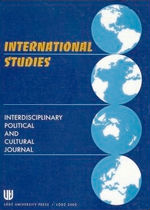MOVING BEYOND EDWARD SAID: HOMI BHABHA AND THE PROBLEM OF POSTCOLONIAL REPRESENTATION
MOVING BEYOND EDWARD SAID: HOMI BHABHA AND THE PROBLEM OF POSTCOLONIAL REPRESENTATION
Author(s): Sumit ChakrabartiSubject(s): Social Sciences, Sociology, Ethnic Minorities Studies
Published by: Wydawnictwo Uniwersytetu Łódzkiego
Keywords: Postcolonialism; representation; Edward Said; Homi Bhabha; Gayatri Spivak; postmodernism; Third World/First World; mimicry; religious nationalism; ambivalence
Summary/Abstract: The essay takes up the issue of postcolonial representation in terms of a critique of European modernism that has been symptomatic of much postcolonial theoretical debates in the recent years. It tries to enumerate the epistemic changes within the paradigm of postcolonial theoretical writing that began tentatively with the publication of Edward Said’s Orientalism in 1978 and has taken a curious postmodern turn in recent years with the writings of Gayatri Spivak and Homi Bhabha. The essay primarily focuses on Bhabha’s concepts of ambivalence and mimicry and his politics of theoretical anarchism that take the representation debate to a newer height vis-à-vis modes of religious nationalism and Freudian psychoanalysis. It is interesting to see how Bhabha locates these within a postmodern paradigm.
Journal: International Studies: Interdisciplinary Political and Cultural Journal (IS)
- Issue Year: 14/2012
- Issue No: 1
- Page Range: 5-21
- Page Count: 17
- Language: English

